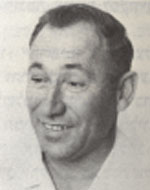Moshe, son of Yehudit and Baruch, was born on March 25, 1928 in Hadera and studied at the elementary school in Hadera and the high school in Kibbutz Mizra, and completed his studies at the Technion in Haifa, and was a good student who combined his studies with his activities in the fields of realization and training. He was a member of the Hashomer Hatzair movement and later served as a counselor in the Kinneret in Kiryat Ata and afterward in Hadera, where he was responsible and serious in everything he did, and excelled in dedication and loyalty in carrying out every task he undertook in both civilian life and military service. For all this he was friendly and loved to help others, honest and conscientious In September 1948, after serving in the ranks of the Haganah and joining the infantry brigade, he served in training positions and completed compulsory service with the rank of sergeant, and Moshe was active in the company, “He said. Moshe was a loyal son and devoted to his parents and family, taking care of his wife Yardena, a daughter of Kfar Yechezkel whom he recognized in the War of Independence and his children. He always enlisted to help, whether for his father to establish their home or for friends, Jews and Arabs alike, on any other mission. He settled in Kibbutz Mizra in 1942 and lived there until his death. He took upon himself the electrical work in the kibbutz and also held social and economic positions. Between 1960 and 1963 he served as the secretary of the agriculture and then, for a year, as the center of the kibbutz. The leadership of the movement forced him to return to educational work and he was joined as a member of the main leadership and was appointed head of the staff for preparing the fourth Shomria, which took place in mid-1966. After returning to Mizra, he was asked to contribute his talents in the field of electricity and was assigned to work in the kibbutz’s hydraulic plant, as sales manager and later as plant manager. He was a member of the “Hakibbutz Haartzi” Executive Committee and served in this position for eight years (1965-1973). He was often called for periods of long reserve duty, during which he completed a course for battalion commanders in the infantry and after a course for retraining of armored personnel carriers, Champion. According to his commander, Moshe excelled in knowledge, dedication and agility, with exceptional efficiency and responsibility. He participated in all the wars in Israel in various command positions and was given the signals of the wars he participated in. In the Yom Kippur War, Moshe stood during the entire war, so that his battalion would be integrated into the enemy’s attack system. Indeed, the battalion participated under his command in the cleansing of Khan-aranabe and the conquest of Um-Butna. On the 19th of Tishrei 5740 (19.10.1973) the battalion was preparing to stop a counter-attack by the Syrians in the Um-Butana area. The commando unit in which Moshe suffered a direct hit and Moshe was injured and died of his wounds, was brought to the eternal rest of Mazra’s civilian cemetery, leaving behind a wife and five children and parents. “In a letter of condolences to the bereaved family, one of his commanders wrote:” I was impressed by Moshe’s devotion and desire to give all his ability, his dedication and his enthusiasm for every performance, and above all, his deep and comprehensive friendship. He always aspired to perfection, with great concern and care for each of his subordinates, and a friendly relationship with the commanders. “One of his subordinates wrote:” He loved the IDF and devoted a great deal of time to finding mechanical solutions to the technical problems of the armored corps, while being aware of the special structure of the armored infantry unit. “His family took out his orders and their problems, In light of hAnd in his memory a chapter was devoted to his memory in a booklet that his kibbutz published in memory of his sons who fell in battle. These pamphlets contain the words of friends, soldiers and commanders, about the character of Moses and letters from his mouth. In one of them he wrote: “Yardena, be strong, I allowed myself to write to you a little freely, in the hope that candor will only strengthen you and thus I will be free to evacuate.
